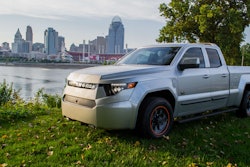Toyota announced today that around 2025 all Toyota and Lexus models will be available with electrified powertrain options.
Though no models were specifically named, Hard Working Trucks confirmed with the automaker that its plans for electrification include its pickup trucks.
Toyota writes in its press release that “the number of models developed without an electrified version will be zero.”
Electrified powertrain options will include hybrid electric vehicles (HEVs), plug-in hybrid electric vehicles (PHEVs), battery electric vehicles (BEVs) and fuel cell electric vehicles (FCEVs).
FCEVs will be available in the commercial sector in the 2020s. Toyota was the first OEM to successfully launch an FCEV, the Mirai sedan in 2014. FCEV technology from the Mirai is being used to power the automaker’s Class 8 hydrogen fuel cell semi, Project Portal, which has been hauling goods in a regional capacity from ports in Southern California since October.
Today’s announcement also offers insight into Toyota’s ongoing efforts to enhance battery technology, a common stumbling block for fleets and consumers alike that have been concerned with range limitations, weight and packaging and cost.
“Toyota has been actively developing next-generation solid-state batteries and aims to commercialize the technology by the early 2020s,” the press release states. “In addition, Toyota and Panasonic will start a feasibility study on a joint automotive prismatic battery business in order to achieve the best automotive prismatic battery in the industry and to ultimately contribute to the popularization of Toyota’s and other automakers’ electrified vehicles.”
China’s at the top of the list for being the first nation to receive Toyota’s newest BEV models, ten of which will be available worldwide by 2025.
Toyota reports that it will continue to collaborate with government agencies and business partners to help expand alt fuel support and infrastructure, including streamlining battery reuse and recycling as well as assisting in establishing hydrogen and vehicle charging stations.
Other highlights from the press release:
- By around 2030, Toyota aims to have sales of more than 5.5 million electrified vehicles, including more than 1 million zero-emission vehicles (BEVs, FCEVs).
- Additionally, by around 2025, every model in the Toyota and Lexus line-up around the world will be available either as a dedicated electrified model or have an electrified option. This will be achieved by increasing the number of dedicated HEV, PHEV, BEV, and FCEV models and by generalizing the availability of HEV, PHEV and/or BEV options to all its models.
- As a result, the number of models developed without an electrified version will be zero.
Zero-emission Vehicles
- Toyota will accelerate the popularization of BEVs with more than 10 BEV models to be available worldwide by the early 2020s, starting in China, before entering other markets―the gradual introduction to Japan, India, United States and Europe is expected.
- The FCEV line-up will be expanded for both passenger and commercial vehicles in the 2020s.
Hybrid Electric and Plug-in Hybrid Electric Vehicles
- The HEV line-up will also grow, thanks to the further development of the Toyota Hybrid System II (featured in the current-generation Prius and other models); the introduction of a more powerful version in some models; and the development of simpler hybrid systems in select models, as appropriate, to meet various customer needs.
- Toyota also aims to expand its PHEV line-up in the 2020s.












